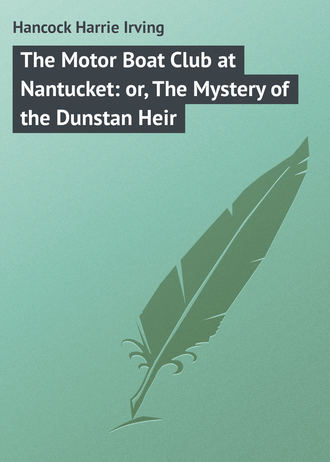 полная версия
полная версияThe Motor Boat Club at Nantucket: or, The Mystery of the Dunstan Heir
“It’s a wonder they didn’t see all this whitewhen I was up in the tree,” he muttered, as hestole along in pursuit. “The leaves must havecovered me mighty well.”
For perhaps five minutes Halstead keptsteadily behind the pair, guiding himself by thedistant sound of their steps, for they did notkeep to any path. Then suddenly the boyhalted. The noise of footsteps ahead had diedout. Tom stood, silent, expectant, but no soundcame to his ears in the next two or three minutes.Then a disagreeable conclusion forceditself on the young skipper’s mind.
“Gracious! They’ve slipped away from meor else they’re at the end of their tramp.”
Again Halstead stole forward on tiptoe. But, though he spent nearly the next half-hour inexploring, he found nothing to reward hissearch. He came at last to a road which hejudged to be the same one along which he hadstarted with the Spaniard. Taking his coursefrom the stars, seaman fashion, Halstead keptalong. Within ten minutes he was upon a roadthat looked like a highway.
“Say, but how good that sounds!” he thrilled, suddenly halting. He had the presence of mindnext to slip behind the trunk of a big tree.
A horse was moving lazily along the road.There was the sound of wheels, too, thoughabove all rose a cheery whistling, as thoughthe owner of that pair of lips were the happiestmortal alive. It was a good, contented whistling.It had about it, too, the ring of honesty.The cheery sound made Tom Halstead feel faithat once in the owner of that whistle.
Then there came into sight a plain, much-wornopen buggy, drawn by a sleek-looking grayhorse. Seated in the vehicle was a youngsterof about Tom’s own age, who looked much likea farmer’s boy. He had no coat on, his suspendersbeing much in evidence. On his headhe wore a nondescript, broad-brimmed strawhat of the kind used by haymakers. At least itlooked as though it might once have been thatsort of a hat, but its shape was gone. Fromwhere Halstead stood not much of a glimpsecould be had of the boy’s face.
“Good evening, friend,” Tom hailed, steppingout from behind the tree.
“Evening! Who-o-oa!” The other boyreined up, peering down through the semidarkness.“Want a lift?”
“Just what, if it happens that you’re headedtoward the town of Nantucket,” Tom replied.
“That’s just where I’m headed. But holdon – gracious! I came within an ace of forgetting.I’ve got to turn back and drive to Sanderson’sfor a basket of eggs. Won’t take me long, though. Pile in.”
Tom gladly accepted the invitation. After hislate experiences it seemed good to be againwith some one who appeared to be wholesomeand friendly. The other boy turned about, layingthe whip lightly over the horse.
“Look as if you were off of some yacht,”commented the other boy, noting Halstead’sblue trousers and cap.
“I’m the skipper at present on Mr. Dunstan’s‘Meteor,’” Tom explained.
“Say, that’s the man whose son disappearedto-day,” exclaimed the other boy.
“Then you’ve heard about it?”
“Yep; it’s all over the island now, I guess.Constables been going everywhere and asking aheap of questions. Have they found youngTed?”
“I’m afraid not,” sighed Tom.
“Too bad. But who could have wanted himto disappear?”
“That’s a long story,” Tom answered discreetly.“But say, where are you going?”
For the young driver was turning off theroad to go to the very farmhouse to which thepier seemed to belong.
“To Sanderson’s, as I told you,” replied theother boy.
“Does that pier down at the water front belongto him?”
“Yep, though I guess he don’t have muchuse for it.”
“What sort of man is Sanderson?”
“Good enough sort, I guess.”
“What does he do for a living?”
“He farms some, but I guess that don’tamount to a lot,” replied the young driver. “Ihear he’s going into some new kind ofbusiness this fall. Some kind of a factory he’sgoing to build on the place. I know he’s beenhaving a lot of cases of machinery come overon the boat from Wood’s Hole lately.”
“Machinery?” echoed Halstead. Somehow, from the first, that word struck a strange notewithin him.
“There’s Sanderson, now,” continued theyoung driver, pointing toward the house withhis whip.
Then the buggy drew up alongside the backporch. Halstead had plenty of chance to studythis farmer as he greeted the young driver:
“Hullo, Jed Prentiss. After them eggs?”
“Yes; and nearly forgot ’em.”
“I reckoned you’d be along about now. Well,I’ll get ’em.”
Farmer Sanderson appeared to be about fiftyyears of age. He would have been rather tallif so much of his lanky height had not beenturned over in a decided stoop of the shoulders.He had a rough, weather-beaten skin that seemedto match his rough jean overalls and flannelshirt. The most noticeable thing about this manwas the keenness of his eyes. As the farmercame out again to put the basket of eggs in theback of the buggy Tom Halstead asked suddenly:
“Do you know a man who looks like aSpaniard and wears brown striped trousers and ablack coat?”
Farmer Sanderson, so the young captainthought, gave a slight start. Then he unconcernedlyplaced the basket in the buggy beforehe answered:
“Can’t say as I know such a party. But I’veseen a fellow that answered that description.”
“When, if I may ask, and where?”
“Why, late this afternoon I saw such a partyhanging around my pier. I s’posed he wasfishing, but I didn’t go down to ask any questions.”
Tom put a few more queries, though withoutbetraying too deep an interest. Farmer Sandersonanswered with an appearance of utterfrankness, but Tom learned nothing from thereplies.
“I wonder,” ventured Jed Prentiss, afterthey had driven some distance along the road,“whether you think your Spanish-looking partyhad anything to do with Ted Dunstan’s beingmissing?”
Tom laughed good-naturedly, but made noreply, thinking that the easiest way of turningoff the question.
“Say,” broke in Jed again after a while, “Iwish you could get me a job aboard the ‘Meteor.’”
“What kind of a job?” inquired the youngcaptain.
“Why, I’m generally handy aboard a boat.Been out on fishing craft a good deal. The jobI struck Mr. Dunstan for, some weeks ago, wasthat of steward. You see, I’m a pretty fair seacook, too. But Mr. Dunstan said he didn’t needa steward or a cook aboard. I wonder if he’dchange his mind.”
“He might,” replied Tom.
“Do you think you’d like to have meaboard?”
“From what I’ve seen of you, Jed, I think Iwould,” replied Tom Halstead heartily. “Atany rate, I’ll speak to Mr. Dunstan about you.”
“Will you, though?” cried Jed delightedly.“Say, I’d give my head – no, but the hair offthe top of my head – to go cruising about on the‘Meteor.’ It must be a king’s life.”
“It is,” Tom assented.
Then, for some time, the two boys were silentBut at last Tom Halstead, after some intensethinking, burst out almost explosively:
“Machinery? Great Scott!”
“Er – eh?” queried Jed, looking at him in surprise.
“Oh, nothing,” returned the young skipperevasively. “Just forget that you heard me sayanything, will you?”
“Sure,” nodded Jed obligingly. Soon after, they drove into the quaint little old seaport, summer-resort town, Nantucket. Tom’s glancealighted on a bicycle shop, still open. ThankingJed heartily for the lift, Halstead hurriedinto the shop. He succeeded in renting a bicycle, agreeing that it should be returned in themorning. Then, after some inquiries as to theroad, Tom set out, pedaling swiftly.
He got off the road once, but in the end foundthe Dunstan place all right. At the gatewayto the grounds Halstead dismounted. For afew moments he stood looking up at the house, only a part of which was lighted.
“Machinery?” repeated the young skipper tohimself, for the twentieth time. “Machinery?Eh? Oh, but we want to know all about that, and, what’s more, we’ve got to know. Machinery!It pieces in with some other facts thathave come out to-day.”
Then mindful of the fact that the news he borewas, or should be, of great importance to thedistracted master of the house beyond, TomHalstead, instead of remounting, pushed hiswheel along as he walked briskly up the driveway.
“Machinery!” he muttered once more underhis breath. He could not rid himself of themagic of that word.
Yet it was a huge pity that the young motorboat captain could not have possessed sharpenough vision to see into the heart of a denseclump of lilac bushes that bordered the driveway.Had his vision been that keen he wouldhave seen his very Spaniard crouched low inthe clump.
That worthy saw the boy and watched himwith baleful, gleaming eyes. It was a look thatboded no good to the young skipper.
“You are too wise, young gringo, and, besides, you have struck me down,” growledAlvarez. “But we shall take care of you. Youshall do no more harm!”
CHAPTER VII – “THE QUICKEST WAY OF WALKING THE PLANK”
It was Tuesday when Ted Dunstan disappeared.Now, Saturday had arrived.
On Monday the heir must appear, withhis father, in the probate court, or the greatfortune would be forever lost to the young man.
The days from Tuesday to Saturday hadbeen full of suspense and torment to thosemost interested. Horace Dunstan had lost hiseasy-going air. He started at the slightestsound; he hurried up whenever he heard otherstalking. Every new sound gave him hope thathis son was about to appear in the flesh.
Far from slow had the search been. Mr.Dunstan’s messages had brought a score of detectivesto the scene. Some of these, aided bythe local constables, had scoured the island ofNantucket unavailingly. The greater numberof the detectives, however, had operated onthe mainland, their operations extending evento Boston and New York.
Yet not a sign of the missing boy had beenfound. There was not a single clew to his fate, beyond the little that Tom Halstead and JoeDawson had been able to tell concerning Alvarezand the florid-faced American.
Halstead’s notion about Farmer Sanderson’s“machinery” had crystallized into the beliefthat the cases of “machinery” received by thefarmer were in reality cases of arms and ammunition, intended to be shipped to aid some newrevolution in Honduras. Alvarez and theflorid-faced man, the latter undoubtedly a seafaringman, might justly be suspected of beingemployed in some scheme to smuggle militarysupplies to Honduras. Tom had read in thenewspapers, more than once, that filibusterssending military supplies to Central Americanrepublics label their cases of goods “machinery”in order to get past vigilant eyes unsuspected.Gregory Dunstan was known to beinterested in revolutionary movements, andFarmer Sanderson might be suspected of helpingAlvarez and other filibusters by havingarms and ammunition shipped to him as machinery, and afterwards slipped out of the countryfrom the end of the farmer’s pier on somedark, stormy night. Moreover, Gregory Dunstanand his friends were the sole ones whocould be interested in having Master Ted vanishat such a time. All parts of the theoryfitted nicely together, Tom thought, and HoraceDunstan agreed with him.
Yet anything relating to attempts by filibustersto ship arms secretly to another countryshould be brought to the notice of the UnitedStates Government. So Mr. Dunstan wrotefully to the authorities at Washington, who,so far, had not taken the pains to reply to hiscommunication.
During these days the “Meteor” had beenalmost constantly in service. Tom and Joefelt nearly used up, so incessant had been theirwork. Jed Prentiss was now aboard, for, withdetectives arriving and departing at all hours, there was frequently need of serving a visitorwith a meal while the “Meteor” dashed overthe waves to or from Nantucket. Jed was enjoyinghimself despite his long hours and hardwork. He even found time to hang about Joeand learn much about the running of themotor.
By Saturday noon Horace Dunstan, whoseemed to have aged much, gave up the notionthat his detectives could aid him at Nantucket.The last three on the island were sent over toWood’s Hole on the “Meteor,” with instructionsto help the men at work on the case onthe mainland.
“Thank goodness, we’re through with ’em,”grunted Jed, leaving the galley and coming upthrough the engine room hatchway. “I hopewe’ll get a breathing spell to-morrow.”
“We’ve had a brisk four days of it,” noddedTom. “I wouldn’t mind that at all, if onlywe had gotten any nearer to finding Ted. Butall this work and nothing gained is enough towear a fellow out.”
It was a part of Tom’s nature that he feltkeenly all of his employer’s worries over themissing Ted, It worried Halstead, too, tothink of any boy hopelessly losing such a hugefortune as was at stake.
“If only we could find Alvarez, and get agood grip on him,” growled Halstead, as Joecame up on deck, “I’d feel almost warranted intorturing him until he told all he knew.”
Joe nodded gravely, then suddenly grinned.
“I can imagine anyone as big-hearted as youare, Tom, putting any human being to the torture.”
“I said I’d almost be willing to” insistedTom.
“Well, you won’t find Alvarez, so what’s theuse of arguing?” asked Dawson, slowly. “Heand his red-faced friend have skipped awayfrom this part of the country, I believe.”
“And Mr. Dunstan has only until Monday,”sighed Halstead. “And Ted to lose millions!Did you ever hear of a case of such tough luckbefore?”
Jed began to whistle sympathetically. He, too, would have given worlds to be able topounce upon the vanished Ted. For youngPrentiss was all loyalty. Having entered theDunstan employ, he felt all the sorrows of thefamily. The more he thought about the affairthe more restless the whistling boy became.
“How long are we tied up here for?” demandedJed, at last.
“Until the late afternoon train gets in fromBoston,” Tom answered, listlessly. “Mr. Dunstanis expecting Mr. Crane, his lawyer, along.If Mr. Crane doesn’t arrive we’ve got to comeover again to-morrow morning.”
Jed glanced at the clock before the steeringwheel.
“Hours to wait,” he went on, dismally.“Well, I’m going ashore to stretch my legs,if there’s no objection.”
“None at all,” Halstead replied, “if you’reback on time.”
Jed was over the rail in no time, whistling ashe went. A few minutes later Tom Halsteadfound himself bored by this inactive waiting, and so, as Joe had some cleaning to do on theengine, the young skipper decided to take astroll ashore.
In the village all looked so decidedly dull, this hot July afternoon, that Tom walked onthrough and beyond the little place. After hehad gone the better part of a mile he seatedhimself on a tumble-down bit of stone wall betweentwo big trees. It was cool here, andshady. The drone of insects soon made theboy feel drowsy.
“Here, there mustn’t be any of this,” mutteredHalstead, shaking himself awake. “Imustn’t fail to get back to the boat on time.”
After that he was wide awake. But thegreen, the quiet and the cool air made the youngcaptain feel that he did not care to leave thisspot until it was necessary. For perhaps fifteenminutes more he sat chewing at a wisp ofgrass and thinking – always of the missingheir.
Then the sound of a short little cough madehim look up. Some one was coming along theroad. That some one came in sight. Almostchoking with astonishment, Halstead wentbackward over the wall. It looked as thoughhe had fallen, but it was all part of his franticwish to get out of sight.
“Alvarez, by all that’s unbelievable!” hegasped, as he lay utterly still behind that wall.“It doesn’t look like him, but it’s his size, hiscarriage, his walk, his little tickling cough ashe inhales his cigarette!”
The man was coming nearer, walking at asteady though not rapid gait. Tom huggedhimself as close to the ground as he could, peeringbetween two stones in the wall. For aninstant, as the other went by, Halstead had agood glimpse of the fellow. Where Alvarezhad but a moustache, this man had a full blackbeard. Gone were the brown striped trousers, for this man wore a blue serge suit. But theface was swarthy; there was the same gleamin the dark eyes. Even the way of holdingthe fuming little cigarette was the same.
“It’s Alvarez, or his double, disguised,”breathed Halstead, frantic with joy. “I’ll jumpon him, and pin him to the earth!”
On swift second thought the excited boychanged his mind. It might serve a far biggerpurpose to follow this swarthy little rascal, ifhe could do so undetected.
Alvarez, apparently, wasn’t suspicions of beingtrailed, for he kept steadily on. Halsteadfollowed on the other side of the wall, ready todrop out of sight at the first sign of the other’sturning. When the wall ended the boy foundother shelter, and followed on. It was but ashort chase. A quarter of a mile further onthe Spaniard left the road, pushing his waythrough the bushes and undergrowth of a patchof woods until he came to a small, almost hiddencove. And in this cove, her stern withinstepping distance of the land, lay a yellow-hulledsteam launch.
Tom sank low behind the bushes, and peeredthrough. He could see all that followed.
“Pedro!” called Alvarez, softly.
A man who had been dozing up in a seat bythe bow of the boat now awoke and turned, displayingthe face of a negro. He was a big andstrong built fellow. And Tom, the instant heheard that low call from the bearded stranger, knew it to be Alvarez’s voice.
Pedro hurried to the stern. Some talk betweenthe two followed, but in tones so low thatHalstead could understand not a word of it, until the Spaniard, half turning away, finishedby saying:
“I’ll be back soon. Be ready – and be watchful.”
The negro nodded heavily as the Spaniardstarted away. But this time Tom Halsteadmade no effort to follow the swarthy one. Ifthe Spaniard was to return, that would not benecessary.
“I wonder how fast I can return to Nantucket, and then be ready to chase this craft when sheshows her nose outside?” wondered the boy.“For it’s five to one this launch will make forAlvarez’s hiding-place, and that is where TedDunstan is to be found. Yet – confound it all! – ifI give chase in the ‘Meteor,’ Alvarez certainlywon’t lead us to the place.”
It was a puzzling, an immense problem. Andwhatever was to be done must be decided uponinstantly. While Halstead still pondered, acheering sound came to his ears. “Whirr-ugh!Whirr-ugh!” The negro, in his former seatat the bow of the launch had proved his watchfulnessby going sound asleep and snoring!
“Oh! If I could only get through to Alvarez’shiding-place on this boat!” thought Tomwildly, his breath coming hard and fast. Notime was to be wasted in doing nothing. Assuringhimself that the negro was still soundlyasleep, Halstead stepped forward, cat-footed.
Still the black guardian of the boat slumbered.Tom, as he reached the water’s edge, prayed that nothing would disturb the fellow’ssleep. The launch was not a cabin affair, butthere was a covered deck at the bow, and, underit, a hatchway leading into a little cubby.As the negro sat sleeping, his legs crossedsquarely before the entrance to that cubby.Then Halstead edged around until he made surethat there was another little cubby under thestern-sheets of the launch.
“If I could only get in there and hide!”breathed the young skipper, fervently. Hardlyhad he formed the wish when he steppedstealthily to the boat. His eyes watchfully onthe negro, Tom gained the stern hatch. He bentdown before it to inspect the space beyond.The space in there was small, and much of ittaken up by the propeller shaft boxing. Itlooked like taking a desperate chance to tryto fold himself up in that tiny space.
“But this is a time to take desperatechances!” gritted the young motor boat captain.“And it’s the only chance I see that looksgood!”
Another glance at the snoring negro, andTom Halstead stealthily worked his feet inthrough the hatchway. His body followed. Hetwisted and wriggled until he had got himselfas far back into the limited space as was possible.His head was where he could gaze out intothe cockpit of the launch.
“I know just what a sardine feels like, anyway, after the packer gets through with it,”reflected the boy, dryly. He stretched a little,to avoid as much as possible the cramping of hisbody.
Then he had a wait of many minutes, thoughat last the hail of Alvarez was heard from theshore. It took a second call to rouse the sleepingPedro.
“Now, quick out of this,” ordered the Spaniard.“Get up the anchor. Then take yourplace by the engine.”
Alvarez himself went forward to the wheelat the bow. The launch was soon under way, moving at what appeared to be its usual speed, about six miles an hour.
“Neither one has seen me in here,” thoughtTom, tensely. “Oh, what huge luck if they gothrough the trip without seeing me!”
Though Halstead could not even guess it, from where he lay, the launch took a north-easterlycourse along the coast, and was presentlyabout two miles from shore.
“Pedro,” chuckled the Spaniard, at last, looking back at the negro who squatted by theengine, “if my own father saw me now wouldhe know me for Emilio Alvarez? Would he?”
“He’d be a wondahful smart man if he did,fo’ shuah,” grinned the negro.
“In this disguise I would hardly be afraidto walk about in Nantucket,” continued SeñorAlvarez. “I doubt if any of my enemies wouldrecognize me. They – ”
Alvarez’s lips shut suddenly with a snap.While he was speaking he had been lookingastern. Tom Halstead now squirmed as he sawthe Spaniard’s startled gaze fixed directly onhim.
“Pedro!” shouted the swarthy one. “Looksharp, man. There’s some one in that cubbyastern!”
Alvarez had started himself to leave the wheel.Then, realizing that the boat would run wildwithout some one at the helm, he pointed dramatically.
Though Halstead had trusted to the darknessand the shadow in that cubby, the discovery thathe dreaded had happened. Not willing to becaught in there, like a fox in a trap, he made alively scramble to get out. He was on his feetin the cockpit by the time that Pedro, staringas though at a ghost, leaped up and faced him.
“Grab the boy!” shouted Alvarez in glee.“Nab him and hold him fast. Pedro, you shallhave a present for this!”
As Halstead scrambled out he had looked forsome object with which to defend himself.There was nothing at hand. He was obligedto face his bigger assailant with nothing but hisfists.
“Keep off!” warned Halstead, throwing uphis guard.
As the negro leaped for him Tom shot outhis left fist, landing on the side of the blackman’s head. The blow had no effect, save thatit angered Pedro, who struck out with his ownright. It was a powerful blow. Halsteaddodged so that he received it only glancingly, but the act of dodging threw him off his balance.He toppled, then plunged swiftly overboard, sinking from sight.
“Stop the engine! I want him alive!”screamed Alvarez, leaping away from the wheel.
Pedro responded swiftly, stopping the speed, then reversing the engine briefly. The launchwas brought to, almost stationary, close tothe place where Tom Halstead had fallenoverboard.
“Get the boat hook,” commanded Alvarez.“Jump in after him if necessary. I want thatmeddling boy. I’ve a score to settle with him.”
But, though both remained at the rail forsome time, peering down into the water, TomHalstead did not reappear.
“Fo’ goodness’ sake,” chattered the blackman soberly, “dat boy done sink, fo’ shuah. Heain’t gwine come back, boss.”
“The propeller must have struck him on thehead,” declared Alvarez thoughtfully. Then, with a white face and an attempt at a lightlaugh, he added:
“After all, what does it matter, Pedro?That’s the quickest way of walking the plank.We didn’t mean to drown him – but we’re rid ofhis meddling!”
CHAPTER VIII – TOM DISCOVERS THE HEIR
Tom Halstead wasn’t drowned – notquite. The wicked seldom find safetyin believing that their evil work hascome out in the way that will most benefit them.We shall presently see what did happen to Tom.
Although he tried to pretend that he was notaffected by the tragedy that he believed had justbeen enacted, Señor Alvarez, when he returnedto his seat by the wheel, did not at once call forspeed ahead. Instead he rolled a fresh cigarettewith trembling fingers, spilling so much ofthe tobacco that he had to make a fresh start.When, at last, he had the thing lighted and hadtaken a couple of whiffs, he turned to the blackman to ask:
“After all, Pedro, what difference can itmake if the meddling boy chose the ocean to ourcompany? Am I not a gentleman of Honduras,Don Emilio Alvarez? Am I not descended fromSpanish grandees? Why should I bother myhead because one of the American riff-raff hasgone overboard!”









